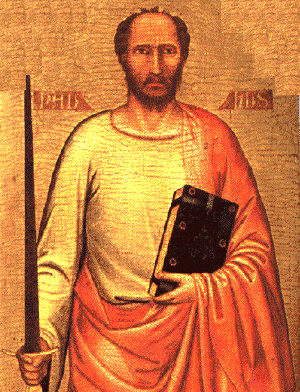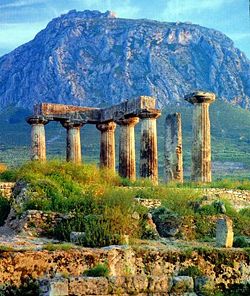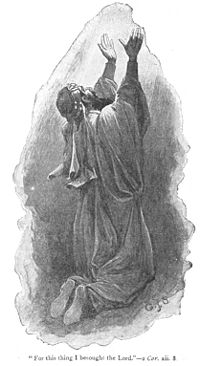| New Testament |
|---|
The Second Epistle to the Corinthians is a book in the New Testament, written by Paul the Apostle. Paul's most personally revealing letter, it portrays the great apostle as an embattled leader whose authority has been severely tested and who feels the need to justify himself by "boasting" of his suffering and sacrifices for the church. Writing after a second, "painful" visit to Corinth, Paul expresses pleasure that his emissary, Titus, has returned with a good report. However, Paul is fearful that when he comes again, problems will persist—ranging from challenges to his authority to sexual immorality in the church community.
Paul also asks the Corinthians to renew their efforts to collect a donation which he plans to present to the church at Jerusalem. He apparently hopes to win the favor of the leading apostles there, who may have grown concerned about the fidelity of Paul's churches to their tradition. In the later chapters of the epistle, Paul bitterly denounces certain "false apostles," by whom the Corinthians have been influenced to doubt Paul's authority. Because these chapters differ so strongly in tone from most of the rest of the epistle, some commentators believe it is actually a later letter from Paul which was eventually combined with the earlier text.
Several memorable verses come from 2 Corinthians, including "God loves a cheerful giver," and "where the Spirit of the Lord is, there is freedom." It also contains the account of Paul's vision of the "third heaven," the infamous "thorn" in his side which plagues him yet keeps him humble, and his so-called "meditation on immortality."
Background
Corinth was an important Roman city and particularly close to Paul's heart. He saw himself as the church's spiritual father and founder. Paul reveals this fatherly attitude toward the Corinthian church when he writes: "I promised you to one husband, to Christ, so that I might present you as a pure virgin to him. But I am afraid that just as Eve was deceived by the serpent's cunning, your minds may somehow be led astray from your sincere and pure devotion to Christ." (11:2-3)
Paul's contacts with the Corinthian church can be tentatively reconstructed as follows:[1]
- Paul visits Corinth for the first time, spending about 18 months there (Acts 18:11). He then leaves Corinth and spends about three years (roughly from 53 to 57 C.E.) in Ephesus. (Acts 19:8, 19:10, 20:31)
- Paul writes the now lost "warning letter," (see below) probably from Ephesus.
- Paul writes 1 Corinthians from Ephesus (1 Corinthians 16:8).
- Paul visits the Corinthian church a second time, as he indicated he would in 1 Corinthians 16:6, probably still during his three years based in Ephesus. This trip did not go well, and is described in 2 Corinthians 2:1 as a "painful visit."
- Paul writes the "letter of tears" referred to several times in 2 Corinthians: "I wrote as I did so that when I came I should not be distressed by those who ought to make me rejoice... For I wrote you out of great distress and anguish of heart and with many tears..." (2:2-4)
- Paul writes 2 Corinthians, indicating his desire to visit the Corinthian church a third time. (2 Cor 12:14, 2 Cor 13:1) The letter does not indicate Paul's location, but it is usually dated after Paul left Ephesus for Macedonia (Acts 20), from either Philippi Thessalonica in Macedonia.[2]
- Paul presumably made his third visit after writing 2 Corinthians, because Acts 20:2-3 indicates he spent three months in Greece after his stay in Ephesus. Also, in his letter to Rome, written at this time, he sent salutations from some of the principal members of the Corinthian church to the Romans.[2]
Content
Paul, writing with Timothy, refers to himself as an "apostle of Christ Jesus by the will of God" and addresses his letter not only to the Corinthians but to "all the saints throughout Achaia." He defends his conduct toward the Corinthians and "boasts" of the clarity of his message (1:12-13), probably in contrast to other teachers. A sense of trouble between Paul and the Corinthian church lurks as he tells his readers: "it was in order to spare you that I did not return to Corinth" (1:23) and refers to an earlier "painful visit." (2:1) He also refers to a previous letter which "I wrote you out of great distress and anguish of heart and with many tears."
In any case, the situation at Corinth is still troubling to Paul. A particular member of the church, not named, has "grieved" the church, apparently by refusing to obey some command in Paul's previous letter. The member has already had "punishment inflicted on him by the majority." Paul declares this chastisement sufficient and now asks that the offender be forgiven. (2:5-11)
Paul also decries certain teachers who "peddle the word of God for profit" and carry impressive letters of recommendation. As the founder of the Corinthian church, Paul needs no such letters. In punning on the word "letter" and contrasting the "old" covenant with the "new," Paul coins the famous phrase: "the letter kills, but the Spirit gives life." (2:6) A few lines later he provides the well-known verse: "Now the Lord is the Spirit, and where the Spirit of the Lord is, there is freedom." (2:17) Playing with the analogy of the veil which covered Moses' face from the Israelites and another "veil" which now causes many of the Jews not to recognize Jesus as the Messiah, he declares: "The god of this age has blinded the minds of unbelievers, so that they cannot see the light of the gospel of the glory of Christ." (3:4)
Paul's suffering
With his authority threatened, Paul insists that "we do not preach ourselves, but Jesus Christ as Lord." However, he goes on to list his own credentials as a sufferer for the cause of Christ:
We are hard pressed on every side, but not crushed; perplexed, but not in despair, persecuted, but not abandoned; struck down, but not destroyed. We always carry around in our body the death of Jesus, so that the life of Jesus may also be revealed in our body. (3:8-10)
Feeling that he often faces death, Paul begins his brief but famous meditation on immortality. One must keep in mind, he says, that which is "unseen" and eternal, not what is "seen" and temporary. Echoing 1 Cor. 15:44, where he describes both a natural body and the spiritual body, Paul declares that "if the earthly tent we live in is destroyed, we have a building from God, an eternal house in heaven, not built by human hands." (5:1) Thus, to be "at home" in one's physical body is to be "away for the Lord." Christ died that all may live and share in his resurrection, and "if anyone is in Christ, he is a new creation." (5:17) He boldly declares that "now is the time of God's favor, now is the day of salvation." (6:1)
Returning to the theme of his personal sufferings, Paul lists such trials as "beatings, imprisonments... sleepless nights and hunger... dishonor, bad report... regarded as impostors... beaten, and yet not killed; sorrowful, yet always rejoicing; poor, yet making many rich; having nothing, and yet possessing everything." Having thus opened his heart to the Corinthians, Paul urges them to do likewise to him.
Purity and separation
Verses 6:14-7:1 are regarded by many commentators as an insertion—possibly of a fragment of another letter of Paul or perhaps from another writer[3]—for it suddenly takes up a new topic, and the letter flows much more logically if 7:2 follows 6:13. The topic is fellowship—perhaps marriage—with unbelievers. "Do not be yoked together with unbelievers," the writer commands. "For what do righteousness and wickedness have in common?" (6:14) Whether this section is by Paul or not, it has left us with one of "Paul's" more famous quotes. "We are the temple of the living God." The idea, however, is not simply that a believer should be pure himself, but that to be pure, he should be entirely separated from unbelievers. A very un-Pauline passage follows, quoting from the Jewish purity traditions which Paul usually said no longer apply: "Touch no unclean thing, and I will receive you." (6:17)
The letter now returns to the theme of open-heartedness (7:1) and urges the reader to "perfect holiness out of reverence for God." Paul expresses no regret—then reverses himself and apologizes—for sending his previous letter, which he knows must have hurt.[4] However, he is happy now, because of those who repented as a result. Also, Titus has returned to Paul with a good report of the Corinthians, who received him with respect and obedience as Paul's representative.
Funds for the Jerusalem church
Paul now turns to a fundraising issue. Throughout later missionary travels, Paul worked to raise funds to bring as an offering to the Jerusalem church. He instructed the Corinthians to prepare such a donation in 1 Cor. 16:1-4. The crisis in Paul's relations with the Corinthians had apparently delayed this collection, but now Paul urges it to be renewed as an expression of the Corinthians' loyalty. To collect the offering, Paul is sending emissaries, one of whom he identifies tantalizingly as "the brother who is praised by all the churches for his service to the gospel." (8:18) Unfortunately, this great evangelist is left unnamed. The passage also yields the famous verse: "God loves a cheerful giver." (9:7)
Another abrupt change of mood and topic at the beginning of chapter 10 leads commentators to suspect another insertion here. Paul shifts to an angry and sarcastic tone, revealing raw and obviously still hurt feelings. Some believe this to be a later letter of Paul which was at some point combined with the "thankful letter" that precedes it. Another explanation for the mood shift is that Paul may have broken off from dictating the letter after chapter 9 and returned when he was in a different mood, possibly after receiving disturbing news of a new challenge to his authority at Corinth.
'False apostles'
In any case, the topic now shifts back to a defense of Paul's own character and authority.
"Even if I boast somewhat freely about the authority the Lord gave us for building you up rather than pulling you down, I will not be ashamed of it," he declares (10:8).
Rival teachers are again on his mind, possibly representing, or at least claiming to represent, one or more of the Twelve—the original apostles directly appointed by Jesus. Paul is not intimidated by them, however. "I will keep on doing what I am doing in order to cut the ground from under those who want an opportunity to be considered equal with us in the things they boast about. For such men are false apostles, deceitful workmen, masquerading as apostles of Christ." (11:12-13)
Paul is extremely distraught that the Corinthians have accepted the authenticity of these teachers, who seem to be contradicting Paul in a major way. "If someone comes to you and preaches a Jesus other than the Jesus we preached," he chides, "or if you receive a different spirit from the one you received, or a different gospel from the one you accepted, you put up with it easily enough." (11:4)
Regardless of the qualifications of these "superlative apostles," Paul insists, they cannot match his own credentials in terms of suffering for the sake of the Gospel. In the process of defending himself, Paul speaks revealingly of one of his own visions, in which he reports being carried away into the "third heaven" and seeing "inexpressible things." (12:1-5) Here, he also speaks of the famous "thorn in my flesh, a messenger of Satan, to torment me." Paul declares that this affliction—seen by some as a physical disability or disease and others as some embarrassing spiritual weakness—to be sent by God to keep him from spiritual pride because of his visions.
Paul concludes by expressing a plan to visit the Corinthians "a third time." However, he fears that when he comes he will find many sins: "there may be quarreling, jealousy, outbursts of anger, factions, slander, gossip, arrogance and disorder. I am afraid... I will be grieved over many who have sinned earlier and have not repented of the impurity, sexual sin, and debauchery in which they have indulged." (12:20-21) He threatens hard punishment for the offenders: "I will not spare those who sinned earlier or any of the others." However, he hopes that when he comes, he will be able to use his authority to build up the church rather than to chastise its members who have sinned. He closes with a brief benediction.
Textual issues
While there is little doubt among scholars that Paul is the primary author of 2 Corinthians, there is much discussion over whether the letter was originally one letter or a combination of two or more of Paul's letters, with some possible insertions by one or more other writers as well.
Although the New Testament contains only two letters to the Corinthians, the evidence from the letters themselves is that he may have written at least four:
- 'The Warning Letter'—The sentence, "I have written you in my letter not to associate with sexually immoral people," (1 Cor 5:9) refers to an earlier letter, now apparently lost. Some scholars see fragments of the "warning letter,"—sometimes called the "strict letter"—in chapters 1-9 of 2 Corinthians itself, for example in 6:14-7:1. Others believe this section is not by Paul, since its attitude on purity laws seems to them to be contrary to Paul's theology.
- 1 Corinthians itself.
- The Letter of Tears—This letter is referred to in 2 Corinthians 2:3-4 and 7:8. The majority of critical scholars believe that this letter must have been written between 1 Corinthians and 2 Corinthians but has been lost. Some think this may be 1 Corinthians but many commentators do not believe 1 Corinthians matches the description. Still others believe that a part of the "letter of tears" was combined with 2 Corinthians as the current chapters 10-13.
- 2 Corinthians itself.
Significance
This epistle reveals the personality of the Apostle Paul more than any other. Paul's deep affection for the Corinthian church is particularly evident, as are his hurt feelings over its all too apparent imperfections. In the process, Paul's own human weakness, sense of betrayal, self-vindication, absence of charity toward his competitors, and lack of diplomatic skills are clearly displayed—but no less than his ample spiritual strength, humility, willingness to forgive sinners who repent, and particularly his zeal for the spiritual welfare of the church of Christ and its members.
Second Corinthians is also a rich source of information about the early church, much pondered by historians and textual critics alike. It has yielded some of the New Testament's finest verses, such as "God loves a cheerful giver," "the letter kills but the Spirit gives life," and "where the Spirit of the Lord is, there is freedom."
See also
- First Epistle to the Corinthians
- Third Epistle to the Corinthians
- Authorship of the Pauline Epistles
Notes
- ↑ 2 Corinthians: Introduction, Argument, and Outline, by Daniel Wallace www.bible.org. Retrieved November 10, 2007.
- ↑ 2.0 2.1 Corinthians, Second Epistle, Easton's Bible Dictionary, 1897. www.ccel.org. Retrieved November 10, 2007.
- ↑ Some scholars see a connection between the language of this section and the Dead Sea Scrolls, which call for a radical separation between believers and sinners. Others think it may be a fragment of Paul's earlier "warning letter." However, some critical scholars, as well as traditionalists, insist that such abrupt changes of subjects are not unusual for Paul, and that the issue of holiness may have been in the back of Paul's mind all along, as this was clearly a major problem in the Corinthians' church.
- ↑ A hint is provided here about the subject of Paul's previous letter. Paul states that the letter "was not on account of the one who did the wrong or of the injured party." Those who believe the "previous letter" is 1 Corinthians point out that Paul does refer in that letter to a "man who has his father's wife" and chides the Corinthians for tolerating such an act. (1 Cor 5)
ReferencesISBN links support NWE through referral fees
- Barclay, William. The Letters to the Corinthians. The Daily study Bible series. Philadelphia: Westminster Press, 1975. ISBN 9780664241087
- Furnish, Victor Paul. II Corinthians. Garden City, N.Y.: Doubleday, 1984. ISBN 9780385111997
- Keener, Craig S. 1—2 Corinthians. New Cambridge Bible commentary. Cambridge, UK: Cambridge University Press, 2005. ISBN 9780521834629
- Laymon, Charles (ed.). The New Interpreter's Bible: General Articles & Introduction, Commentary, & Reflections for Each Book of the Bible, Including the Apocryphal/Deuterocanonical Books. Nashville: Abingdon Press, 1994. ISBN 9780687278145
- Stedman, Ray C., and James D. Denney. Letters to a Troubled Church: Studies in 1 and 2 Corinthians. Grand Rapids, Mich: Discovery House Publishers, 2007. ISBN 9781572932555
External links
All links retrieved January 23, 2018.
- Online Bible at GospelHall.org
| |||||||||||||||||
Credits
New World Encyclopedia writers and editors rewrote and completed the Wikipedia article in accordance with New World Encyclopedia standards. This article abides by terms of the Creative Commons CC-by-sa 3.0 License (CC-by-sa), which may be used and disseminated with proper attribution. Credit is due under the terms of this license that can reference both the New World Encyclopedia contributors and the selfless volunteer contributors of the Wikimedia Foundation. To cite this article click here for a list of acceptable citing formats.The history of earlier contributions by wikipedians is accessible to researchers here:
The history of this article since it was imported to New World Encyclopedia:
Note: Some restrictions may apply to use of individual images which are separately licensed.




